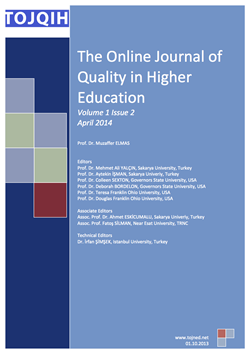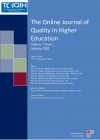TOJQIH - Volume 1 - Issue 2 - April 2014
 A Critical Look At Civil Engineering In The European Higher Education Area: The Case Of Spain
A Critical Look At Civil Engineering In The European Higher Education Area: The Case Of Spain M. I. Rodri├ī┬üguez, F. J. Alegre, M. Zamorano, J. Garrido
Abstract: On 25 May 1998, the European Higher Education Area (EHEA) was constituted in Paris. It established the need to create a common Higher Education for all the countries of the European Union. Accordingly, the Declaration of Bologna was signed on 19 June, 1999, defining the actions necessary for Universities to adapt to the EHEA, and after ten years of study, it was put into action in Spain in 2010. This article aims to analyse the problems surrounding Education in Civil Engineering in Spain, under the dictates of the EHEA, in order to establish a Contingency Plan comprising Actions for Quality Improvement, after of the first two years of implementation of the EHEA in the Degree of Civil Engineering in the University of Granada.
 A investigation on satisfaction of graduate students in China
A investigation on satisfaction of graduate students in China Zhou Wenhui, Li Minglei, Han Xiaofeng
Abstract: During October to December 2011, Research Center for Graduate Education of Beijing Institute of Technology launched a great investigation on students├óŌé¼Ōäó satisfaction with graduate education in 35 different level and type graduate education institutes around China, involving 7293 graduate student respondents. And that aims to evaluating the quality of graduate education based on the perspective of students├óŌé¼Ōäó satisfaction. Some valuable conclusions can be drawn from the study: By and large, over 60% of graduate students, according to the investigation result, are satisfied with current situation; while certain difference exist among different kinds of graduate groups, male students show higher satisfaction than female students; the students in research institutes show higher satisfaction than the students in colleges; medical students show the highest satisfaction than the students studying at any other majors; the doctoral candidates show higher satisfaction than the master degree candidates; the academic degree graduate students show a little higher satisfaction than the professional degree graduate students. In addition, the weak point of graduate education lies on management and services.
 High Stake Testing At The Entrance To Higher Education In Turkey
High Stake Testing At The Entrance To Higher Education In Turkey Ali Baykal
Abstract: In Turkey the imbalance between supply and demand for tertiary education is the main reason for having the Student Selection Examination (SSPE) at the entrance. SSPE is being criticized by everyone but it is acknowledged by the whole society for some thirty years. The resources allocated to higher education are very low. Therefore it is obligatory to select the most capable students to make the investment most efficient. Student success at school of course is a very important factor, but there is some evidence that it is not as predictive as SSPE. The reliability of SSPE battery is quite high. A selection test is not supposed to cover the whole domain of all subject matter areas. The main purpose of SSPE is not to appraise present competencies but to predict the future performance. SSPE must be maintained as a fair balance for justice rather than a jack of all trades.
 How Total Quality Management Can Support Stem Education
How Total Quality Management Can Support Stem Education Efthimia Staiou, Sencer Yeralan
Abstract: In today├óŌé¼Ōäós global competitive environment TQM has been acknowledged by industry and services to be a successful managerial strategy in continuously improving organizational performance. During the last 20 years there is a strong debate on whether TQM can be adopted in education. This paper summarizes past experiences in TQM implementation in higher education and discusses issues that need to be faced, in order to recognize the unique aspects of education. Many higher educational institutions have recognized the importance of quality in their field and have begun to apply TQM programs taking advantage of the anticipated benefits that TQM has to offer. STEM (Science, Technology, Engineering, and Mathematics) on the other hand is becoming a very popular concept in education, especially in the United States and the United Kingdom. This paper presents the way the main principles of TQM in higher education can serve the demands and objectives of STEM education.
 Lecturers├óŌé¼Ōäó Perception On Teaching Evaluation: Selection Of Research Instruments
Lecturers├óŌé¼Ōäó Perception On Teaching Evaluation: Selection Of Research Instruments M. S. Sulong
Abstract: Evaluations are used as a key measure of teaching quality by many higher learning institutions in lecturer performance processes. They can also be used by lecturers to inform reflections on teaching, and thus contribute to the development and enhancement of teaching, courses and student learning. However, there are limited studies have been done that focus on how lecturer perceive on teaching evaluation by students. Normally, questionnaire was used to conduct the study in a quantitative approach. In this paper, a summary of three questionnaires is layout showing the validity and reliability of its significant based on the content of these instruments. Other aspects such as the amount of items required in the questionnaire, the length of questionnaire, and the questionnaireresponse rates are also presented. By ensuring the quality of teaching and learning, this paper is intended to add up to the literature giving the best selection of research instruments of lecturer├óŌé¼Ōäós perception on teaching evaluation, that best suits the criteria of the research instruments selected for this study.
 Problems Encountered In Educating Qualified Workforce In Vocational High Schools And Solution Seeking
Problems Encountered In Educating Qualified Workforce In Vocational High Schools And Solution Seeking Lu├ī╦åtfiye DAHI├īŌĆĪL, Abdurrahman KARABULUT, Fatma TAHTA
Abstract: In this century, in which technological development proceeds, it is seen that manpower to work within production sector can not satisfy the expectations of sector. As a result, competition opportunities of companies decrease and their need in educated work force increases that much. The purpose of this study is to research the reasons why qualified work force to satisfy expectations of production sector can not be trained in vocational schools in Turkey and to propose a solution. The machines working with advanced technology are not used efficiently and safely in production sector; this situation poses an obstacle before the aim of providing high quality product at low cost. The resolution is that trained and qualified employees should use the machines within production sector and then quality education should be provided in vocational high schools.
 Quality Enhancement Of Palestinian Higher Education Institutions: The Case Of Islamic University Of Gaza (IUG)
Quality Enhancement Of Palestinian Higher Education Institutions: The Case Of Islamic University Of Gaza (IUG) Sanaa I. Abou-Dagga, Alyan A. El-Holy
Abstract: The Palestinian tertiary education system considered to be young according to international standards, as the establishment of the oldest university was only forty years ago. The Palestinian universities were created during Israeli occupation, as part of a Palestinian collective effort to preserve the Palestinian identity as well as to provide young Palestinians with the opportunity to pursue higher education. Quality assurance efforts in Palestine had begun in 2002 with the establishment of the Palestinian Accreditation & Quality Assurance Commission (AQAC). IUG, being one of the biggest higher education institutions in Palestine, established its quality unit immediately and worked in linking its internal quality procedures with external national ones managed by AQAC. The purpose of this paper was to describe IUG quality procedures; with regard to: students, academic programs, teaching and learning, university staff, university environment, administration, and the collection of external feedback. Several challenges were presented along with lessons learned.
 Quality In Higher Education In Greece: Deming├óŌé¼Ōäós Theory Vs Ministerial Laws In Hellenic Universities
Quality In Higher Education In Greece: Deming├óŌé¼Ōäós Theory Vs Ministerial Laws In Hellenic Universities Stamatis Gargalianos
Abstract: In this presentation, an analysis of Greek laws that came into force in the last 30 years in order to improve higher education in Greece is initially attempted. These laws were introduced so as to improve higher education in Greece, but also to harmonize, quantitatively as well as qualitatively, with the wishes and needs of the employees involved, i.e. professors, students and administrative staff. In parallel, Deming├óŌé¼Ōäós theory is presented and examined as a one which focuses on improving business structures in companies and organizations. This paper attempts a comparative approach between the laws of the Greek state concerning higher education and the principles of Deming, trying to examine whether they can be applied, but also contribute to the improvement of the existing structure in Greek Universities.


